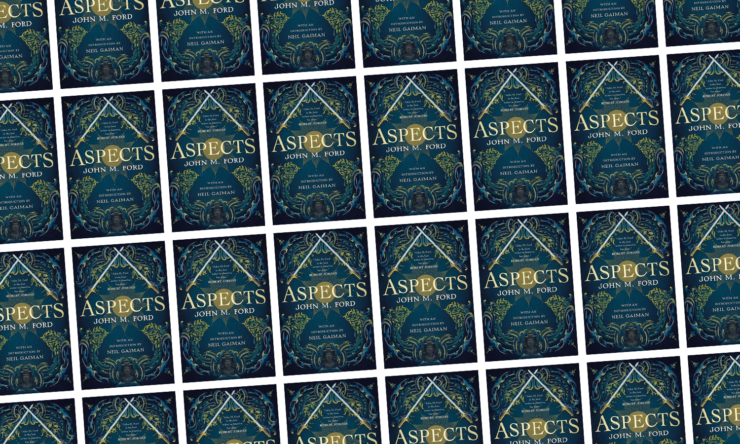There are books that you never want to end, and John M. Ford’s novel Aspects is one of them. And Aspects does not, in fact, end: It stops, two pages into a chapter, forever abridged by the author’s untimely death in 2006. Always a critical favorite but rarely if ever a bestseller, Ford had many friends and more admirers; they’ve likely already picked up this final novel. But if you haven’t read Ford, or even heard of him? Should you attempt its five hundred unfinished pages? My answer is an emphatic “yes.”
After many years out of print, John M. Ford needs a re-introduction. Neil Gaiman, who has not needed introduction for twenty-odd years, provides it. In a touching foreword, Gaiman offers a portrait of Ford as steadfast friend and humble genius. He also explains the farcical communication breakdown between Ford’s estate and Ford’s literary agent that delayed this book’s publication for more than a decade. Gaiman’s introduction promises wonders; the reader turns the page and discovers that Ford’s book delivers them.
Aspects, intended to be the first novel in a series, follows several characters, but principal among them are the aristocratic “Corocs” Varic and Longlight, both members of the parliament in Lystourel, a rapidly modernizing capital city that is variously reminiscent of late-Victorian London, post-Imperial Rome, pre-Revolutionary Paris, and Terry Pratchett’s Ankh-Morpork. There’s a code duello abstruse enough to please a nineteenth-century Prussian junker, sufficient inhuman industrialization to appall Dickens, and enough magic to fill several series of books.
Buy the Book


Aspects
Varic, aloof, sardonic, and dedicated, is the lord of a distant region, but it’s been decades since his lordly seat was his home. He’s a creature of the city and its politics; his great goal is to assist his mentor, Brook, in creating a more just and more humane Constitution for his nation of Lescoray. Sometimes, his political opponents attempt to outmaneuver him in Parliament; occasionally they challenge him to duels. Longlight, in contrast to Varic, neither knows nor understands the city. She has a Northern accent, rustic manners, and a fashion sense decades out of date. She has traveled from her distant home to present a petition to the parliament for aid against bandits. Though Longlight bungles the petition, she finds a loyal friend and eventual lover in Varic.
Although the protagonists of Aspects are much concerned with the Ironways, as railroads are named in Ford’s world, the novel strolls and ambles, rather than racing like a runaway train. Ford revels in his world, and expects his reader to share this enthusiasm. If a named character changes from her working dress to evening formalwear, we should expect detailed descriptions of both outfits. For a hundred pages, we follow Varic and Longlight on a pleasant sojourn at Strange House, a vast manse where they rest, recuperate, and enjoy themselves with like-minded, and similarly remarkable, souls. A succession of dinners, masques, religious services, war games, and mock combats reveal subtleties of characters and establish the rules of the world without noticeably advancing the plot. If you’re not sympathetic with Ford’s interests and curious about his world, this genuinely end-less book will feel interminable. I found the abundance of detail and proliferation of digression charming; Aspects almost manages to give self-indulgence a good name.
The novel begins with a duel and swiftly proceeds to an important parliamentary vote, but neither violence nor intrigue predominate. Rather, Ford is concerned with affinities, whether elective or haphazard, and alliances, be they political, philosophical, or erotic. Strange House boasts a well-stocked wine cellar, an impressive library, a noteworthy collection of art, and—wonder of wonders—modern indoor plumbing, but what makes it so precious is the love and camaraderie of its residents and guests. These exemplars of love include: Tacker and Roan, the devoted mothers of the young Hazel; Silvern and Edaire, bound by love and united by magic; Varic and his necessarily platonic love Agate; Birch, disappointed in eros but a loyal friend to all. As Longlight prepares to leave Strange House, understanding strikes her: “She had never, she thought suddenly, been among so many intimacies in as short a time. She could not decide what to think of it—except that it did not seem a bad thing. Indeed, she would not believe it was.”
Not a single plot or subplot runs its course in the book that we’ve received. The mysterious illnesses that strike at two characters? Neither diagnosed nor treated. The Archimage Birch’s first dangerous Communion with the Goddess? Forever unrecounted. The mystery of the death of Varic’s parents? Unsolved. The villains, if villains there be? Unrevealed and never to be punished.
Some of these points might have been cleared up in a short while, but Ford had multiple volumes planned, and I suspect that he intended to trace his invented world through many years, perhaps through several decades. The ironways that Longlight sought to build through her domain would take much planning and more labor; would the next books have shown the transformation they wrought? Would war with Ferangard break out, and might those magical carbines play a decisive role? Will the new Constitution pass? What of the planned Grand Exposition? Then there’s the matter of Hazel, eight years old and a child of Strange House: He wants to enter the broader world, far less egalitarian, the adults worry, than the only home he has ever known. Would Ford have traced his journeys? Then there’s the young boy, Hilt, rescued from a life of banditry. Might he have returned to make his way in Lescoray?
John M. Ford did not live to give his readers the novel he’d almost finished, much less the series that he had planned. But he gave us a world, a world of teeming cities and crumbling castles, of dirt roads and ironways, of political intrigue and supernatural mystery. And he populated that world with believably flawed and sympathetic people. Many complete books accomplish far less. Aspects is an unexpected gift.
Aspects is published by Tor Books.
Matt Keeley reads too much and watches too many movies. You can find him on Twitter at @mattkeeley.










